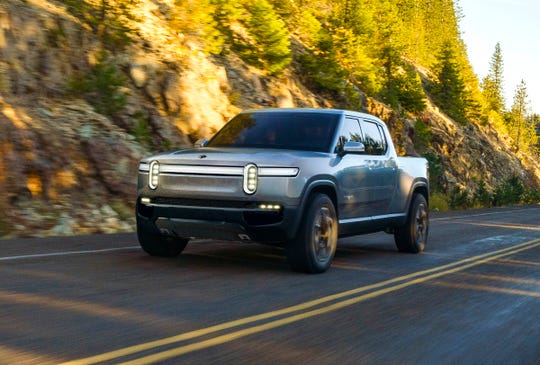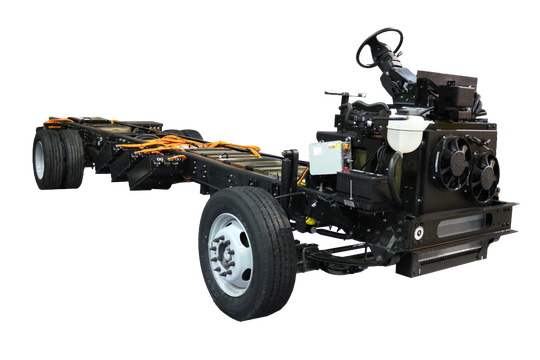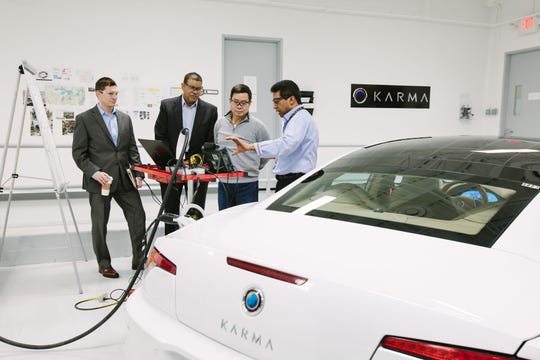Electric Vehicles Will Revive Detroit
Tuesday March 12th… Dear Diary. The main purpose of this ongoing post will be to track United States extreme or record temperatures related to climate change. Any reports I see of ETs will be listed below the main topic of the day. I’ll refer to extreme or record temperatures as ETs (not extraterrestrials).😉
As of March 2019 it’s now obvious that renewables are a big part of the economic future worldwide. In the U.S. alone millions are already employed in the solar and wind power sectors. In the transportation sector where would a logical place be to rev up the mass construction of all electric vehicles needed to replace ICE (Internal Combustion Engine) cars to necessarily thwart climate change and maintain civilization in the long run? Why Motor City-Detroit. Today’s featured topic and article has the positive details on a potential big boom for one of America’s most loved blue collar cities:
I’m taking the liberty of reposting this article:
Detroit is Electric Motor City in a frenzied battle for auto engineering talent
Mark Phelan, Detroit Free Press Published 7:30 a.m. ET March 9, 2019 | Updated 11:05 a.m. ET March 9, 2019
After years when Detroit was Ground Zero for skepticism about electric vehicles, the traditional auto industry’s hometown has become a hub of EV action.
The trend is attracting companies, cash and jobs — potentially including jobs for engineers and executives displaced by restructuring at General Motors and Ford.
At the same time, established automakers and suppliers are boosting their work on EVs at their local engineering centers, making southeast Michigan one of the world’s centers of EV development.
Companies come for the region’s talent, a bounty of engineers and executives who know how to turn ideas into vehicles that start every day, survive crashes and can be built by the million.
“For more than a century, companies in and around Detroit have refined complex electromechanical devices to make them smaller, cheaper, and more reliable for mass-market use in cars,” said John Voelcker, former editor of Green Car Reports.
“That’s what auto engineers do. And more of them do it around Detroit than anywhere else in North America.”

Rivian, an automotive startup with an engineering base outside Detroit in Plymouth Township, unveiled its five-passenger R1T electric pickup concept in conjunction with the 2018 LA Auto Show. (Photo: Ben Moon)
Rivian Automotive, which got a major endorsement when Amazon recently invested $700 million, is a prime example. The developer of electric pickups and SUVs drew huge crowds when it showed its first two models at the Los Angeles auto show late last year. Rivian moved its headquarters to Plymouth, just west of Detroit, in 2015. More than 350 people work there in design and engineering. Rivian plans to build vehicles at a former Chrysler and Mitsubishi plant that it owns in Illinois.
Money talks
“When somebody puts in $700 million, it gets your attention,” said Glenn Stevens of MichAuto and the Detroit Regional Chamber, both of which work with companies that may invest and expand in the region.
Bollinger Motors last year relocated its headquarters, engineering and design from New York state to Ferndale, just north of Detroit on the Woodward Avenue corridor. Employment is just a handful now as Bollinger completes prototypes for electric pickups and SUVs scheduled for production in small numbers starting in 2020. The company hopes to build the B1 SUV and B2 pickup in Southeast Michigan.
“Everything we can, we’re going to do in Detroit,” Bollinger brand director Mark Foster said. Like most people, executives considering investment and hiring in the region frequently use “Detroit” as a shorthand that encompasses much of southeast Michigan.

Detroit Custom Chassis installs powertrains and controls from Motiv Power Systems in Ford F-59 truck frames for electric commercial vehicles. (Photo: Motiv Power Systems)
Detroit Custom Chassis’ plant on Detroit’s east side just began installing powertrains and controls from Motiv Power Systems in Ford F-59 truck frames for electric medium-duty vehicles such as delivery vans
“Companies come here for the talent, experience and because we have test facilities and a physical environment with extremes of hot and cold, snow and rain for testing,” said Lou Donato of the Society of Automotive Engineers.
‘Town is swimming in talent’
The giants are on board alongside the newcomers.
Ford’s high-profile plan to turn Detroit’s Corktown neighborhood into a center of electric and autonomous vehicle development added momentum.
More quietly, GM has reorganized its whole engineering structure to speed up development of a host of electric and autonomous vehicles.

The Karma Revero plug-in hybrid (Photo: ALEXANDER QUEL)
“Every automaker is terrified of being left behind,” said Drew Winter, Wards Automotive content director. “Even though they won’t sell millions of EV in the immediate future, they have to gear up now.
“We’re seeing the beginnings of an industry that’s changing.”
Welcome to the Electric Motor City.
“This town is swimming in talent,” said Jim Taylor, a veteran auto executive and engineer who led several brands at GM and has worked with startup EV makers. “The battle to develop these vehicles is a people war. To be a credible manufacturer, you need to fill 600-700 seats with the skills needed to take a vehicle from design to the dealership.
“Draw a 30-mile circle around Detroit and you find more people with that skill set than anywhere else. It’s the technology hub. That’s what draws these companies.
“You win the battle resumé by resumé.”
Help wanted
GM’s recent white-collar layoffs could be a bonanza for EV companies, Taylor said. That many people with that kind of experience don’t come on the market often. They may be available just when new EV companies need them.
And not just vehicle makers. Suppliers developing everything from electric fast-charge systems to roads that communicate with vehicles have also been drawn by southeast Michigan’s concentration of engineering talent, research facilities and places to test new technologies.

In Karma’s the inside of our Detroit Technical Center in Troy: Eric Keipper, Karma director of vehicle integration; Darren Post, vice president, DTC and Revero chief engineer; Dr. Lance Zhou, CEO; and Vino Pathmanathan, powertrain systems technical specialist. (Photo: Julianne Lindsey)
Karma Automotive, an electric luxury carmaker based in California and owned by Chinese auto supplier Wanxiang Group, realized it needed a Detroit engineering center to work with suppliers. It has about 50 engineers work at in Troy.
“We have so many suppliers and key partners in southeast Michigan that it’s critical to have an office there,” Karma spokesman Dave Barthmuss said. “We’re a California company, through and through, but you can’t ignore the expertise available in Detroit.”
At the same time, GM and Ford are ramping up EV development with the aim of launching high-profile new vehicles in the next two to three years. Fiat Chrysler recently joined the party, announcing its $4.5 billion investment in new local assembly plants and vehicles includes its first major move into EVs. At least 18 automakers have engineering center in the Detroit area. All of them are believed to be doing EV work, as are the many supplier tech centers around town.
“The Detroit area has become a center of expertise for companies developing electric vehicles and infrastructure, said Jim Saber, president and CEO of NextEenrgy, a Detroit-based tech incubator. “Start-ups and many established companies from outside the region are drawn to the area to and access the talent and partnerships to develop produce the vehicles and systems at scale.”
Want a factory? It’ll cost you.
Most tech centers employ dozens to hundreds of people. Detroit’s deep talent pool has proven irresistible for many companies looking for talent. Luring new manufacturing is different.
Vince Carioti, director of German supplier Phoenix Contact E-mobility North American operations was originally told to locate in Silicon Valley when the company needed a tech center to support its move into developing EV charging systems.
“I felt that with our ties to the U.S.-based automotive in Detroit and all the focus on electrification and autonomy, we should be located here” Carioti said.
“This was a challenge. There is so much press and media promoting the Valley and the companies located there.”
He persuaded Phoenix’s CEO to come and see Detroit. “In the end I was successful in convincing him to locate in Ann Arbor. We have one facility (there) and a presence at the Landing zone in downtown Detroit.
“My goal is to eventually have some type of assembly of inlets and charging cables here in the U.S. maybe even Michigan.”
Love ‘em or hate ‘em, government subsidies play a big role in where companies build vehicle assembly sites, which can employ thousands.
Celebrated auto designer Henrik Fisker’s eponymous company recently hired veteran politician Richard Gephardt to select a site for a proposed plant to build around 100,000 electric SUVs a year. Fisker is open about the fact that incentives play a large role in the process. He’s narrowed choices to four states. Michigan isn’t one of them.
Contact Mark Phelan at 313-222-6731 ormmphelan@freepress.com. Follow him on Twitter @mark_phelan. Read more on autos and sign up for our autos newsletter.
Indeed, the future looks very bright for any city willing to embrace new electric technology. I don’t see any minuses here. Can you?
………………………………………………………………………………..
Here is more climate and weather news from Tuesday.
(As usual, this will be a fluid post in which more information gets added during the day as it crosses my radar, crediting all who have put it on-line. Items will be archived on this site for posterity. In most instances click on the pictures of each tweet to see each article.)
(If you like these posts and my work please contribute via the PayPal widget, which has recently been added to this site. Thanks in advance for any support.)
The Climate Guy